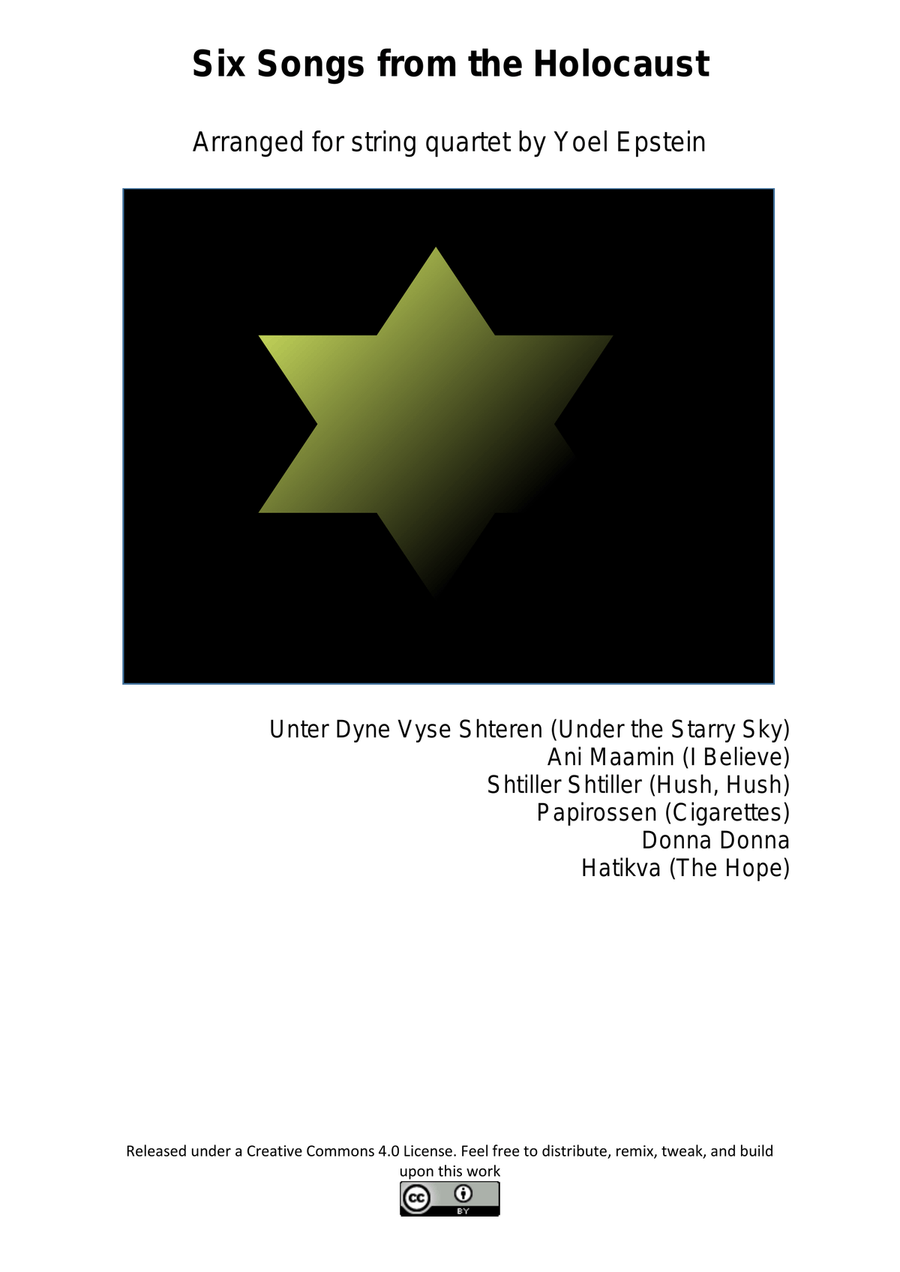String Quartet String Quartet - Level 4 - Digital Download SKU: A0.773330 Composed by Various. Arranged by Yoel Epstein. Christian,Contemporary,Jewish,World. Score and parts. 37 pages. Yoel Epstein #4285845. Published by Yoel Epstein (A0.773330). These six songs have become icons of remembrance of the six million Jews who died in the Holocaust. They are traditionally played on Holocaust Day, which is on the 28th day of the Hebrew month of Nissan in Israel, or January 27th in the rest of the world. Unter Dyne Vyse Shteren (Under the Starry Sky) was written by Avraham Sutskover, a leading Yiddish poet, while trapped in the ghetto of Vilna, in July 1943. Days before the ghetto was destroyed and all the Jews murdered, Sutskover escaped to the forest with his wife. He reached Russia, and in 1947 moved to Palestine. He died in Israel in 2010 at the age of 96. The poem was set to music by Avraham Brodna, a simple laborer in the Vilna ghetto who died in a concentration camp. Ani Maamin (I Believe): The words to this simple song are of the Jewish prayer I believe with perfect faith in the coming of the Messiah. The tune is attributed to Azriel David Festig, a leading Warsaw hazzan (cantor) who died in the Holocaust. The song was performed after the war by Rabbi Shaul Yedidia Eliezer Taub, the Admor (Rabbinical leader) of the Modzitz Hassidic sect, and has become the iconic song of the remembrance in the Hassidic community. Shtiller Shtiller (Hush Hush) was written by Alexander Volkovitzky, then a 12-year-old boy, in the Vilna Ghetto in the spring of 1943. Volkovitzky, who wrote the melody for a song contest organized to encourage the cultural life of the ghetto, eventually came to Israel where he (under the name Alexander Tamir) became a leading pianist and music educator. The words are by Shmerke Kacserginsky, a leading poet of Vilna, who later escaped the Holocaust and migrated to South America. Papirossen (Cigarettes) actually predates the Holocaust by 15 years. It was written by Yiddish actor and composer Herman Yablokoff in 1922 in Grodno, Poland. Yablokoff later immigrated to America, where he produced a musical Papirossen that incorporated the song. It was later made famous by the Barry Sisters, a Yiddish popular music group. Donna Donna was written by Shalom Secunda, with words by Aaron Zeitlin for the Yiddish musical Esterke in 1940. Though the song originally related to the 600-year-old legend of a Polish king who married a Jewess, it quickly became associated with the Holocaust because of its haunting message. The song has entered the popular folk repertoire, with canonical renditions by Joan Baez, Theodore Bikel, and many others. Hatikva (the Hope) is Israel's national anthem. The words are by Naftali Zvi Imber, and the tune is a traditional eastern European tune. You are welcome to try some of my other arrangements. In addition to the songs offered on this site (you can see them at http://www.sheetmusicplus.com/search?Ntt=Yoel+Epstein ), I have arranged three songs from the Holocaust, which I arranged and distribute for free on IMSLP. You can find them at http://imslp.org/wiki/Category:Ravpapa. If you need arrangements of any of these songs for special combinations of instruments, feel free to contact me, and I will try to accommodate. Write me at yoelepst@gmail.com. Hope you enjoy.
